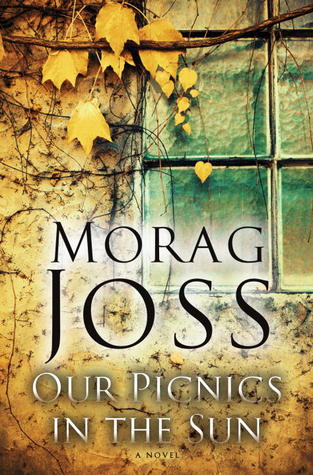My rating: 5 of 5 stars
Our Picnics in the Sun is a quiet, deeply introspective book, one which, for the first half, creates the impression that it is little more than a slice of life tale. The focus is the life that Howard and Deborah Morgan have tried, quite unsuccessfully, to build for themselves by living in tune with nature in a tumbledown cottage on Exmoor, aptly called Stoneyridge. Their son Adam, now grown, rejected his parents’ philosophies, and decamped as soon as possible for a job that could provide him with all that was missing from his childhood. A picture of this family’s strained relationship is related alternately by husband, wife, and son. Howard emerges as a virtual dictator with iron clad ideals, and Deborah as his often unwilling minion. They are as poor now as when they so hopefully set off on their life together so many years ago.
Then, while practicing yoga in the pig shed, Howard suffers a stroke. He survives, and Deborah is left to care for him alone. While this gives her somewhat more autonomy, the couple is more poverty stricken than ever, and she can’t possible manage the house, chickens and sheep along with her patient, who can speak only with halting difficulty. From this point forward, the novel turn from prosaic to masterful. The depiction of Deborah’s struggles as caretaker is brilliant, restrained yet so vivid that the reader can feel what she’s feeling. When Adam fails to return home for a long awaited birthday celebration, her anguish is palpable. This may be one of the most effective evocation of loneliness ever written. Rescue comes in the form of a visitor, a young man by the name of Theo, whose neediness is immediately evident to Deborah and provides an outlet for her frustrated maternal urges.
As the second half unfolds, there is a growing sense of isolation and a vague sort of menace. The moors, upon which the eponymous picnics took place, are a splendid metaphor for the reality of the Morgans’ existence. Suspense builds, although there are no overt threats of any kind. But Deborah, encouraged by Theo, begins to question all the choices she has made. The memories that she recounts are striking, especially the one she most painfully regrets. Perhaps the novel’s conclusion shouldn’t be so startling, but I never saw it coming.
Its darker overtones notwithstanding, Our Picnics in the Sun is lovely and memorable, lyrical in many places and dramatic. It will linger in my mind for a long time.
